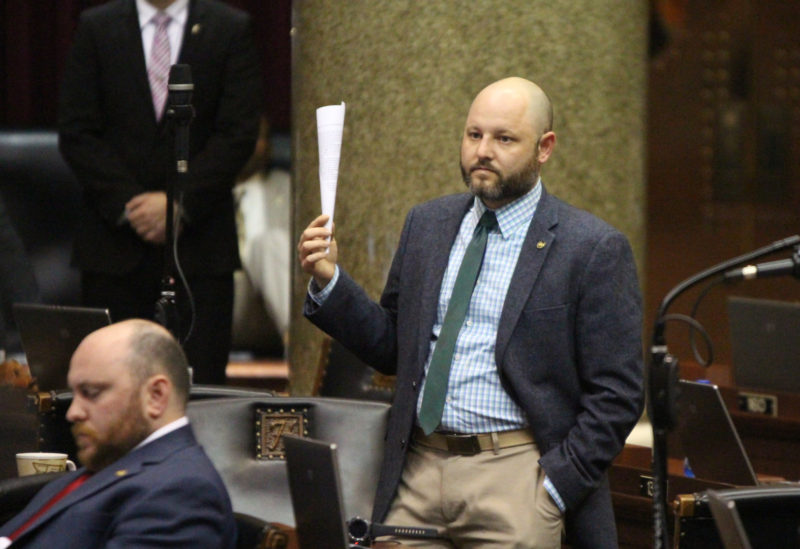With the legislative session taking a week-long hiatus for spring break, we sat down with five of the new freshmen legislators to discuss their perspectives after working in the Capitol for the first half of session.
The fourth piece in this Q&A series features five questions with Rep. Mark Ellebracht, D-Liberty.
The Missouri Times: What surprised you about serving in the body as opposed to being a candidate or a constituent? What was something you didn’t expect?
Rep. Mark Ellebracht: The thing that surprised me the most is the difference that seems to exist between both the St. Louis side of the state and the Kansas City side of the state. I’m not from St. Louis, but I get a sense they just do things a little bit differently. We’re a lot more laid back, a lot more friendly and a lot more open. There’s very little friction I find between myself and Republican members from the Kansas City side because we typically are able to sit down and have good, sometimes hearty, but mostly helpful conversations about issues. St. Louis has a little bit more contentious stuff. They’re dealing with a lot more, the Ferguson issue and how they handle their municipal courts. Me being an attorney from Kansas City who has been in a lot of municipal courts on the Kansas City side, I was appalled, to be honest with you at some of the stories I heard coming out of certain suburban St. Louis areas about the way they’re running their municipal courts. That’s not the way we run business on the Kansas City side.
Another thing that was pretty shocking were the things that objectively looking at situations how much the urban core shared with the rural voters in the state of Missouri. There are cases that may not look and act in the same way, but their problems can be solved with a lot of the same solutions. There is a huge difference between the suburban, corporate interests than the rural and urban interests. The people that fight real hard to get their public schools funded, to get their roads fixed. The people that live in outstate Missouri in rural counties and stuff have the same problems as people living in downtown Kansas City or downtown St. Louis has. They just don’t realize it a lot of times because they’re not being told that. We got sent here to represent our districts and the constituents of our districts, but we also got sent here to legislate for the whole state. I think a lot of times, folks from more sheltered backgrounds or easier living situations find it easy to neglect… I mean we’ve got rural counties here that don’t have 911 service and this is the 21st century. We’ve got people that not only don’t have broadband internet service, which is a shame in itself, but they can’t even pick up the phone and call 911. We’ve got real problems to fix.
TMT: This was your fourth time running for this seat, what was it like to finally clear that hump and get into the legislature?
Ellebracht: The seat hadn’t been won by a Democrat since, I believe, 1996. My area is a very pragmatic kind of district. It’s reasonably well-educated. My constituents from across the district whether they’re Kansas City north residents or Liberty residents, they typically are just very well-educated, they’re very savvy, they’re smart people and they pay attention to what’s going on. To be honest with you for the past decade or so, the Missouri Democratic Party hadn’t given them a lot to vote for. There was a lot of stuff going on that a lot of my voters couldn’t identify with and I understand that, I appreciate that. I have a lot of questions for my party I would like to ask as well.
But for the most part, I think my constituency realized that the money that was spent by special interests in the primary race against [former Rep.] Nick King was an unacceptable demonstration of the corruption of money in politics. I think I was the beneficiary of some of those votes, and I think people had known me long enough and I had run for the seat long enough that there was a level of trust that was established between me and a lot of voters and they preferred me to a lot of dark money and questionable campaign donations that were paid by one very special interest.
TMT: You, along with Assistant Minority Floor Leader Gina Mitten, have taken a big lead on tort reform issues. Can you explain assuming that role and what it means to be a Democratic leader fighting against these measures?
Ellebracht: I’m not fighting against all of the tort reform measures. When people abuse our court system, we owe it to the people of the state of Missouri to rectify that problem. To me, this is not about tort reform as much as it is about a single, very wealthy campaign contributor to a single legislator on the Senate side who appears to be engaging in what I believe is nefarious activity.
Tort reform stuff is a different animal. They want to change the rules and make things a little more predictable for businesses. I understand that. I don’t think that it’s in our constituents’ best interests, but I understand the philosophy behind it.
What I don’t understand, well, I do understand it, but what I don’t accept and what I will not tolerate is what appears to be pay-to-play legislation coming out of the Senate in SB 5. That’s a piece of legislation that will retroactively work to dismiss a lawsuit against the largest single contributor to the Republican Senate President [Ron Richard] in one passage. He filed it and five days later, he had $100,000 from that contributor, from David Humphreys. He had another $100,000 and turned around and pushed it through committee in the first three or four days in the Senate. He intended to get that law passed, and it wasn’t until we raised the banner, it wasn’t until we got people interested and engaged and talking about consumer protection law that he slowed that thing down. It’s my belief he fully intended to pass legislation that would have gotten TAMKO and David Humphreys dismissed from a lawsuit.
TMT: That leads into my next question. I wanted to ask, how important is it to be vocal on that issue specifically, as you have been in the last few weeks?
Ellebracht: There are trends across the United States right now that Missouri is kind of falling in line with. Right-to-work being one of them, making adjustments to prevailing wage laws being another one of them. Those are issues I disagree with in principle, but I understand where they’re coming from and why they’re being done. I get how certain business interests think passing right-to-work might create a better business climate for them. I understand it. I disagree with it because we didn’t get elected to represent businesses, we got elected to represent constituents.
Those trends in American politics towards more corporate, more corporate-friendly legislation are not at all the same as SB 5. I don’t regard their aggression towards unions, I don’t regard their aggression towards organized labor in the same way. Those are philosophical battles we’ve been fighting for decades. That’s not a surprise to me, that’s not a shock to me. That’s something that’s fundamentally different than what that bill, SB 5 was designed to do.
TMT: What’s one bill you would like to get signed during your time in the Legislature?
Ellebracht: If I could flip a switch right now and turn it off, it would be to put a stop to all of this money nefariously corrupting the legislative process. The citizens of Missouri deserve better than that. They deserve to know which politicians are down here for the right reasons and which politicians are down here to get paid off.
[Ellebracht also wrote the bill to require governor’s to release their inaugural expenditures and receipts, in response to a lack of transparency from Gov. Eric Greitens about who exactly paid for his inaugural activities.]
There’s a lot of dark money there. I get it. I understand there’s a lot of people that are cynical in this world. I myself am skeptical. I don’t like campaign donations that come with expectations of performance. I understand these campaigns take money. It takes money to buy advertisements and billboards and mail and stuff like that. Those all cost money and I get that, but if somebody wants to come in to me and say “Hey, submit this bill and here’s $10,000,” I’d say, “Thank you, but no. Keep your money.” I’m not for sale, and I would hope we have that basic understanding among the rest of us here in the Missouri General Assembly.










